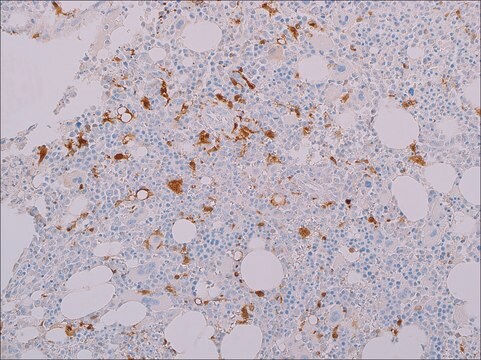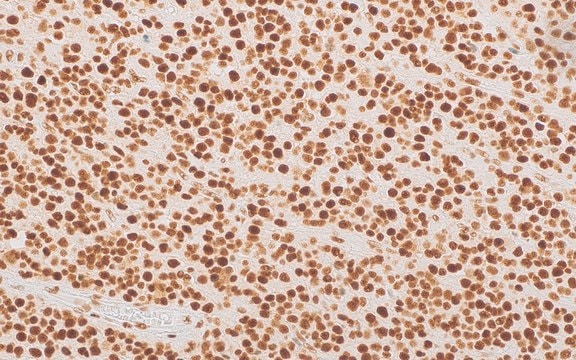358R-1
MUM1 (EP190) Rabbit Monoclonal Primary Antibody
Sinónimos:
Multiple Myeloma Oncogene-1
About This Item
Productos recomendados
biological source
rabbit
Quality Level
100
500
conjugate
unconjugated
antibody form
culture supernatant
antibody product type
primary antibodies
clone
EP190, monoclonal
description
For In Vitro Diagnostic Use in Select Regions
form
buffered aqueous solution
species reactivity
human
packaging
vial of 0.1 mL concentrate (358R-14)
vial of 0.1 mL concentrate Research Use Only (358R-14-RUO)
vial of 0.5 mL concentrate (358R-15)
vial of 1.0 mL concentrate (358R-16)
vial of 1.0 mL concentrate Research Use Only (358R-16-RUO)
vial of 1.0 mL pre-dilute Research Use Only (358R-17-RUO)
vial of 1.0 mL pre-dilute ready-to-use (358R-17)
vial of 7.0 mL pre-dilute ready-to-use (358R-18)
vial of 7.0 mL pre-dilute ready-to-use Research Use Only (358R-18-RUO)
manufacturer/tradename
Cell Marque™
technique(s)
immunohistochemistry (formalin-fixed, paraffin-embedded sections): 1:100-1:500 (concentrated)
isotype
IgG
control
diffuse large B-cell (lymphoma), plasma cell myeloma (tumor), tonsil
shipped in
wet ice
storage temp.
2-8°C
visualization
cytoplasmic, nuclear
Gene Information
human ... PWWP3A(84939)
Categorías relacionadas
General description
Quality
 IVD |  IVD |  IVD |  RUO |
Linkage
Physical form
Preparation Note
Note: This requires a keycode which can be found on your packaging or product label.
Download the latest released IFU
Note: This IFU may not apply to your specific product lot.
Other Notes
Legal Information
¿No encuentra el producto adecuado?
Pruebe nuestro Herramienta de selección de productos.
Storage Class
12 - Non Combustible Liquids
wgk_germany
WGK 2
flash_point_f
Not applicable
flash_point_c
Not applicable
Certificados de análisis (COA)
Busque Certificados de análisis (COA) introduciendo el número de lote del producto. Los números de lote se encuentran en la etiqueta del producto después de las palabras «Lot» o «Batch»
¿Ya tiene este producto?
Encuentre la documentación para los productos que ha comprado recientemente en la Biblioteca de documentos.
Nuestro equipo de científicos tiene experiencia en todas las áreas de investigación: Ciencias de la vida, Ciencia de los materiales, Síntesis química, Cromatografía, Analítica y muchas otras.
Póngase en contacto con el Servicio técnico








